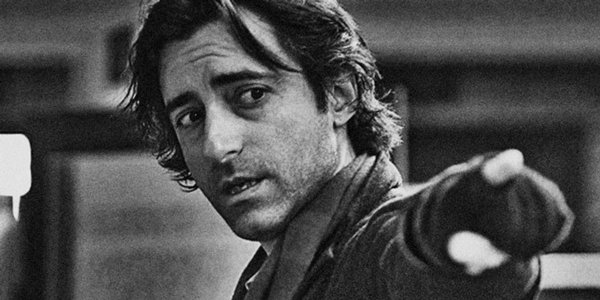Noah Baumbach Explains How He Shook Up His Entire Process To Make Frances Ha

Exhilarating. Grand. Generous. None of those are words anybody would have previously associated with movies by Noah Baumbach, whose acerbic, sometimes brutal humor could verge straight into meanness in films like The Squid and the Whale, Margot at the Wedding and especially the recent Greenberg, which had me accusing Baumbach of being "nearly as self-absorbed and naive as the character himself."
Lucky for me, then, that Baumbach was still willing to talk to me about his new movie Frances Ha, which is indeed all those adjectives promised on the film's poster. Baumbach co-wrote Frances Ha with the film's star, Greta Gerwig, who I also spoke to in the same Union Square hotel last week (read more here). In a recent extensive profile in the New Yorker Baumbach explained that he sought out unusual financing to make Frances Ha, allowing himself more time to experiment with the film's style and to make the movie virtually in secret (the first time most of us heard it was when it was aded to the Toronto Film Festival lineup barely a month before its premiere). I asked him to go into detail about how he shook up his usual method of making movies, and how that made making Frances more of a marathon than, say, the sprint that was Squid and the Whale.
For more on Frances Ha you can watch the trailer here, or look for it in limited theaters now.
After reading the New Yorker profile of you guys, I was really interested in the way that you financed this and I kind of wanted a little more detail. To start with, why did you make it kind of in secret? I get why you wanted to be able to show the streets of New York, without getting attention, but why really keep it under wraps like that?
Well, that was almost a byproduct of it. I wasn’t intending for it to be secret for as long as it remained secret. It did stay off the internet until, I think, Toronto Film Festival. There was kind of pride in gaming the internet, you know, but that was not the goal by any stretch. I mean, I figured we’d be…
Someone would figure it?
Someone would figure it out or you know, or even ask me. I mean, everyone around me knew what I was doing. It wasn’t like we were working in code or something.
CINEMABLEND NEWSLETTER
Your Daily Blend of Entertainment News
Like someone at your manager’s office could have leaked it to Variety and then it would have gotten out, but nobody did.
Easily, easily. I financed the movie before I wrote the script with Greta, so, for that reason too, the script was never out in the world and with actors, I only showed them the parts they were in. So, there was never full scripts circulating. I mean, the crew had them. I think the feeling that everyone who worked on it had, was sort of, it was nice to just focus on something that we were all just doing and it allowed us to just sort of go about our business and not worrying about expectations or when this is going to come out or anything like that, and just kind of make a movie.
Has that kind of stuff ever gotten in your way before, like when you work with bigger stars maybe?
I mean, at worst, it can be kind of an annoyance. Or sometimes I get asked about things like I might have developed or not done in interviews because it gets on the internet. I mean, it’s fine, but it’s like, you know, in the old days people were only really concerned with what you actually put out there, and now there’s so much about, “Will you ever make this project?” With this it took me a while to figure out how I was going to make it and also to figure out the aesthetics of it, because I was shooting digitally and in black and white for the first time. So, I did a lot of tests and a lot of figuring it out.
To go back to the financing thing, how do you then get to do that experimentation when you haven’t financed it for a lot of money. How do you finance something and then say, “We’re going to experiment for a little while.” How do those work together?
Well, I kind of told them that, I mean, they were just really cool with it. They got the concept of it and, you know, they took a calculated risk, but I also told them I wasn’t going to make something experimental, that I was going to make a movie as I would make any of my movie. I had built into it sort of a long period of time before I had to deliver the movie, you know, and they were open to that and that sort of gave me the time to experiment.
And how different does that wind up being from the way you go into say, making Margot at the Wedding? I mean, this seems like a completely different way of structuring a shoot or financing or anything.
It is. I mean, essentially it’s the same because we’re still doing tests, we’re still figuring it out, we’re still doing all of the work we need to do to prepare, but the difference is we have more time to do it. On a traditional film set is, or certainly the budgets I work in, you don’t have the luxury of saying, “I don’t think we’re getting it today. Let’s come back tomorrow." I felt like if I could create a situation where we could do that, than that would be the best thing.
And you just do that by having a crew that knows they’re going to be there like on an accordion schedule, where it might expand out or something?
Yeah, and we also knew that certain pieces of it, like we had the trips, like Paris and Sacramento, were going to be done over. So, we would even break and then go do those a little later, because we wanted Sacramento has to be over Christmas and there were also some things we saved for exterior stuff in the winter.
I was impressed by how many seasons were in there. You don’t see that very often.
Yeah, because we covered a few of them and it also allowed me then to cut the movie and sort of see what I felt if we need different things. Of course the funny thing is you give yourself all these freedoms and then you kind of get it done in about the same amount of time, but in a way it relieves some of the pressure and then it kind of allows you to get it right the first time. On every movie, that you’re making a schedule, you know, you’re making the schedule in order to make the movie, which seems kind of backwards.
Well, it’s like when you’re a writer, you have a deadline and that’s the only thing that’s going to get you to make it.
It’s the same thing, except that you’re spending so much money per day and that’s, a shooting day is really what often what is a big expense. Also I think terrific things come out of that too, like with Squid and the Whale, for instance, I think I shot that movie in 23 days and I think that movie benefited in a way from like this kind of, it was like a sprint…
Just like jump off and get it done?
Yeah, whereas Frances was more, you know, using the running metaphor, it was more a marathon, but you know, I think, you know, they both, it’s sort of like picking what’s right for what project.

When you were selling this to people, when you were finding out who was maybe going to buy this movie down the road, did you know that it was going to be lighter in the way, especially having put Greenberg out there and people not really knowing what to make with the tone? Did you know this was going to have kind of this lightness?
I knew, I was very clear form the beginning that I wanted, that the movie should really support the character in a kind of embrace.
And you knew who the character was by then?
Well, by the time we kind of knew, but I also knew because of Greta and I knew Greta was going to play it and I knew on some level, I knew what that would be. I mean, I totally didn’t know what that would be, but as the character developed because there’s a kind of hope and joy and she’s kind of just throwing herself forward no matter what. I felt like, that it was kind of like our job to make sure she was OK. So, it was kind of built into the material. Like with Greenberg, Greenberg has the movie that was right for Greenberg, you know? I, for me, that movie ends in a kind of hopeful way too, but it’s just a different path of getting there.
Well, it’s got to be a relief, I mean, you make Greenberg and Margot at the Wedding and people are just like, “I hate these people,” and then make a movie, not that you make it for what the audience is going to say, but knowing that you’re going to make people happy, like unambiguously happy has got to be some kind of relief, right?
Well, of course it’s nice, but for me, they’re both equally true. It’s a matter of emphasis, you know, the world is as much Greenberg somedays as it is Frances and I think it’s nice to be able to have a career where I can do both.
Well, I was one of the people trying to tell people to like Margot at the Wedding anyway, but, you know.
People are coming around.
Are they? Is there a second wave coming? You probably hear it more than anybody.
The thing about Margot at the Wedding, you know, you start to learn compliments per movie, like the things that people say per movie, but Margot is always, people always say, [heavy emphasis on the "I"] “I liked it.”
Staff Writer at CinemaBlend
Most Popular






